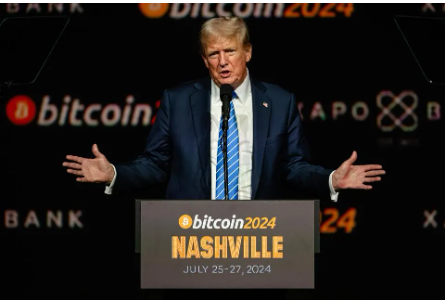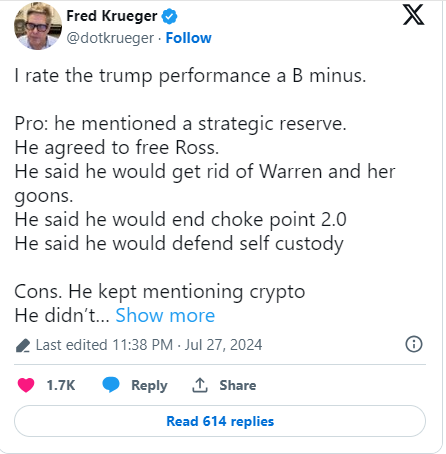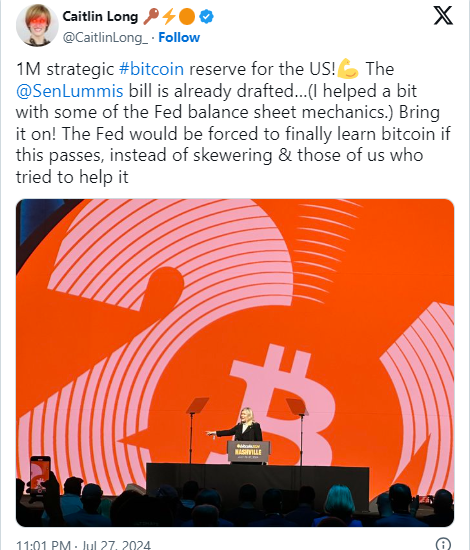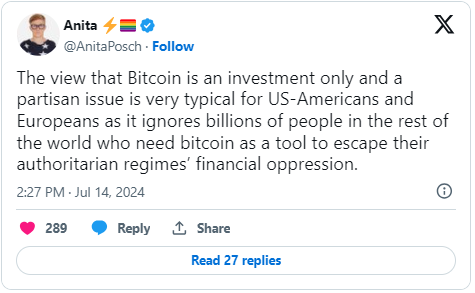Last Saturday, during the bitcoin conference in Nashville, former President Donald Trump made history by giving the keynote address. Ten senators and two presidential contenders attended the gathering, marking a significant occasion in American history. Even after escaping a recent attempt on his life in Butler, Pennsylvania, Trump did not appear to be intimidated.

The Republican’s Pro-Bitcoin Stance
In his speech, Trump laid forth the Republican Party’s position on bitcoin. On his first day in office, Trump declared he would remove Gary Gensler and name a new chairman of the Securities and Exchange Commission who would encourage innovation rather than stifle it. He went on to say that America would emerge as a “powerhouse in bitcoin mining” and he advised fans to hold onto their bitcoins forever.
Additionally, Trump pledged to release imprisoned darknet market operator Ross Ulbricht and to retain every bitcoin that the United States purchases. He also reaffirmed his commitment to upholding peoples’ financial sovereignty and privacy, saying there will be no Central Bank Digital Currency during his administration.

Even while he backed it, Trump’s repeated mentions of “crypto” rather than “bitcoin” raised questions about whether or not he was well informed. In addition, he said that until after the election, he should show the bitcoin community some consideration.
Other proponents of bitcoin were present at the occasion, including as U.S. Senator Cynthia Lummis and independent presidential contender Robert F. Kennedy Jr.

Robert F. Kennedy Jr.
Robert F. Kennedy Jr. also spoke at the conference, discussing the policies he would implement under his presidency including leveraging bitcoin as a strategic national asset. He stated, “Bitcoin is a technology of freedom, independence, and the currency of hope.” RFK Jr. pledged to direct the Treasury to purchase 550 bitcoin per day as a reserve asset from the first day of his presidency and to transfer approximately 200,000 bitcoin to the U.S. Treasury.
Influence Of Satoshi Action Fund
The Republican platform’s wording and concepts demonstrate the Satoshi Action Fund’s sway. This group has played a significant role in informing legislators and advocating for state-level legislation that embraces bitcoin. These laws have been passed by four states, and their efforts have prompted nearly 20 more to consider passing legislation that supports bitcoin.
A Critical Moment For American Politics
The GOP has demonstrated a strong connection with pro-crypto policies by incorporating ‘Bitcoin Rights’ into their party platform, a move that might have a significant impact on future financial legislation in the US. A turning point for Trump and the increased adoption of bitcoin in mainstream politics has come from the combination of financial innovation and political tenacity.
The United States may see more federal policies favouring cryptocurrencies as the GOP supports “Bitcoin Rights,” spurred by state-level victories and grassroots activism.
Bitcoin’s Bipartisan Appeal
Bitcoin is not a partisan issue, as evidenced by its tenacity and the increased interest it is receiving from both parties. The Biden administration has acknowledged the significance of bitcoin, even though the GOP has made it obvious that it supports the cryptocurrency. “It’s not a red party thing, it’s an orange party thing,” said David Bailey, capturing the essence of the situation well.
The US can guarantee a progressive and stable financial environment and pave the road for the acceptance and regulation of bitcoin on a global scale by adopting a nonpartisan strategy.
Congressman Ro Khanna arranged a bitcoin roundtable in Washington on Wednesday, July 10, which was attended by important administration figures as well as well-known people like Mike Brock and Mark Cuban. “I was asked as a condition of being there to not violate the confidence of the discussions,” Mike Brock said to Forbes when questioned about the meeting’s outcome. “But I can say that I was pleasantly surprised by the constructive engagement that was being shown.”
The creator of Bitcoin For Fairness, Anita Posch, tweeted about the wider view of bitcoin’s usefulness:

The apolitical impetus behind bitcoin is demonstrated by the impact of groups like the Satoshi Action Fund, which promotes legislation in favour of the cryptocurrency. International regulatory frameworks for bitcoin are probably going to follow the United States’ lead. In a public statement, Dennis Porter of the Satoshi Action Fund stated, “When the U.S. acts, the rest of the world follows.”
As countries and organisations adjust to the growing relevance of bitcoin in the global financial system, we are seeing game theory come to pass in real time.








